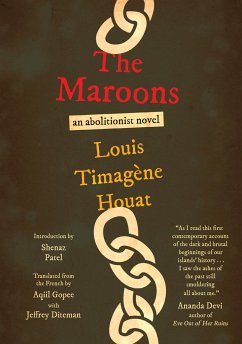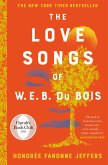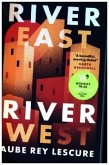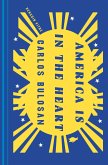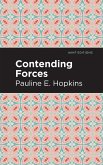A rediscovered classic, and the only known novel by Black abolitionist and political exile Louis Timagène Houat, The Maroons is a fervid account of slavery and escape on nineteenth-century Réunion Island.
Frême is a young African man forced into slavery on Réunion, an island east of Madagascar in the Indian Ocean. Plagued by memories of his childhood sweetheart, a white woman named Marie, Frême seeks her out-but when they are persecuted for their love, the two flee into the forest. There they meet other "maroons": formerly enslaved people and courageous rebels who have chosen freedom at the risk of their lives.
Now available in English for the first time, The Maroons highlights slavery's abject conditions under the French empire, and attests to the widespread phenomenon of enslaved people escaping captivity to forge a new life beyond the reach of so-called "civilization." Banned by colonial authorities at the time of its publication in 1844, the book fell into obscurity for over a century before its rediscovery in the 1970s. Since its first reissue, the novel has been recognized for its extraordinary historical significance and literary quality.
Presented here in a sensitive translation by Aqiil Gopee with Jeffrey Diteman, and with a keen introduction by journalist and author Shenaz Patel, The Maroons is a vital resource for rethinking the nineteenth-century canon, and a fascinating read on the struggle for freedom and social justice.
Hinweis: Dieser Artikel kann nur an eine deutsche Lieferadresse ausgeliefert werden.
Frême is a young African man forced into slavery on Réunion, an island east of Madagascar in the Indian Ocean. Plagued by memories of his childhood sweetheart, a white woman named Marie, Frême seeks her out-but when they are persecuted for their love, the two flee into the forest. There they meet other "maroons": formerly enslaved people and courageous rebels who have chosen freedom at the risk of their lives.
Now available in English for the first time, The Maroons highlights slavery's abject conditions under the French empire, and attests to the widespread phenomenon of enslaved people escaping captivity to forge a new life beyond the reach of so-called "civilization." Banned by colonial authorities at the time of its publication in 1844, the book fell into obscurity for over a century before its rediscovery in the 1970s. Since its first reissue, the novel has been recognized for its extraordinary historical significance and literary quality.
Presented here in a sensitive translation by Aqiil Gopee with Jeffrey Diteman, and with a keen introduction by journalist and author Shenaz Patel, The Maroons is a vital resource for rethinking the nineteenth-century canon, and a fascinating read on the struggle for freedom and social justice.
Hinweis: Dieser Artikel kann nur an eine deutsche Lieferadresse ausgeliefert werden.
"As I read this first contemporary account of the dark and brutal beginnings of our islands' history, I felt heart-broken, not only to be so vividly reminded of the inhuman savagery with which the enslaved were treated, but also for the author's vain hope of an egalitarian society soon to be born. Nearly two centuries later, can his protagonists' dream of becoming 'the masters of their own bodies' be said to have come true? I do not think so: the times of barbarity are not over. Reading the last pages, I saw the ashes of the past still smouldering all about me." -Ananda Devi, author of Eve Out of Her Ruins
"Louis Timagène Houat's harrowing, hopeful abolition novel The Maroons introduces a crucial Black narrative to the English canon. Though painful at times, The Maroons shines a necessary spotlight on the abhorrent cruelty of the not-so-distant history of the Indian Ocean slave trade. Lush descriptions of the island scenery are juxtaposed with the appalling but all too real cruelty delivered at the hands of the 'masters.' The novel was also groundbreaking for its time: it foresees a better future even while it toils in its agonized present. In the face of what appears to be interminable cruelty, its characters still hope that love from fellow human beings will cut through and dismantle generations of prejudice and misguided hatred." - Natalie Wollenzien, Foreword Reviews
"This illuminating novel from Houat (1809-1883), which was banned by French colonial authorities upon its 1844 publication for its negative portrayal of slavery, marks his English-language debut. . . . It's enriched by the lively and substantial supplemental material, particularly Mauritian author Shenaz Patel's introduction, which contextualizes the novel with an account of Houat's lifelong persecution for his abolitionist views. The episodic narrative stands first and foremost as an important historical document." - Publisher's Weekly
"All that is born of the arts and humanities worth its weight poses an inquiry that we must keep returning to even as it risks our discomfort. The Maroons is one such piece-birthed from its own tangled web of silence and suppression, yet shining light on the realities of the African diaspora outside of our familiar geographic and historical scope. The questions it demanded that we sit with well over a century ago still hold within this current environment: What does freedom cost? And is true emancipation when one is willing to risk one's own freedom and life to free others? Faced with every master that goes by different names in our modern world, from the institutional to capitalistic, we must ask ourselves: Which side of the equation do we want to be on, as we think about how to respond as "the masters' abuses escalate"?" -Shanta Lee, author of This is How They Teach You How to Want It...The Slaughter and Black Metamorphoses
"Louis Timagène Houat's harrowing, hopeful abolition novel The Maroons introduces a crucial Black narrative to the English canon. Though painful at times, The Maroons shines a necessary spotlight on the abhorrent cruelty of the not-so-distant history of the Indian Ocean slave trade. Lush descriptions of the island scenery are juxtaposed with the appalling but all too real cruelty delivered at the hands of the 'masters.' The novel was also groundbreaking for its time: it foresees a better future even while it toils in its agonized present. In the face of what appears to be interminable cruelty, its characters still hope that love from fellow human beings will cut through and dismantle generations of prejudice and misguided hatred." - Natalie Wollenzien, Foreword Reviews
"This illuminating novel from Houat (1809-1883), which was banned by French colonial authorities upon its 1844 publication for its negative portrayal of slavery, marks his English-language debut. . . . It's enriched by the lively and substantial supplemental material, particularly Mauritian author Shenaz Patel's introduction, which contextualizes the novel with an account of Houat's lifelong persecution for his abolitionist views. The episodic narrative stands first and foremost as an important historical document." - Publisher's Weekly
"All that is born of the arts and humanities worth its weight poses an inquiry that we must keep returning to even as it risks our discomfort. The Maroons is one such piece-birthed from its own tangled web of silence and suppression, yet shining light on the realities of the African diaspora outside of our familiar geographic and historical scope. The questions it demanded that we sit with well over a century ago still hold within this current environment: What does freedom cost? And is true emancipation when one is willing to risk one's own freedom and life to free others? Faced with every master that goes by different names in our modern world, from the institutional to capitalistic, we must ask ourselves: Which side of the equation do we want to be on, as we think about how to respond as "the masters' abuses escalate"?" -Shanta Lee, author of This is How They Teach You How to Want It...The Slaughter and Black Metamorphoses

